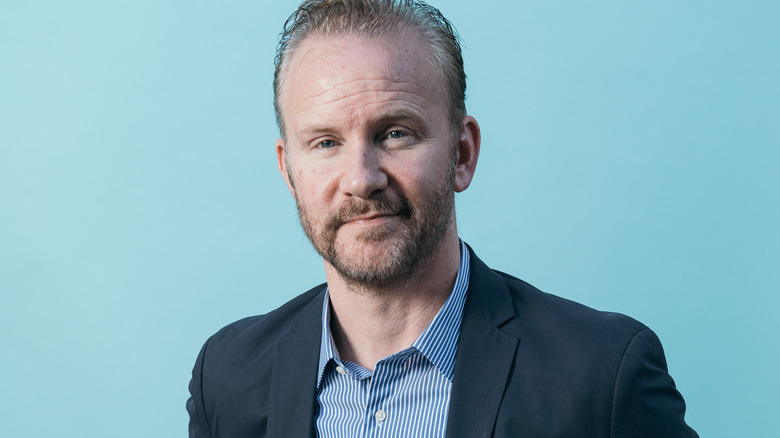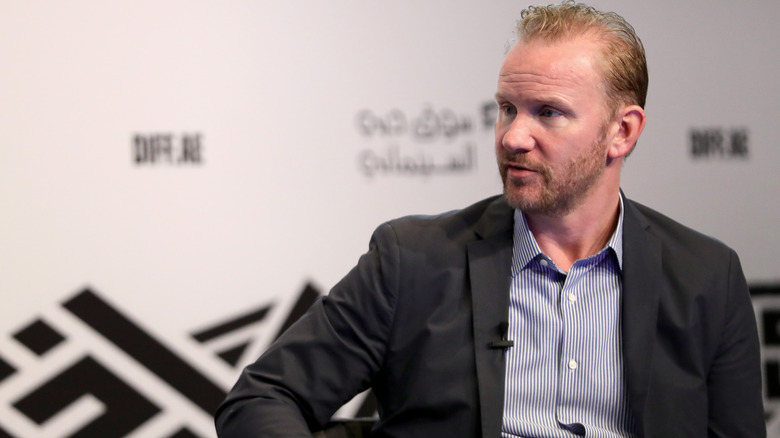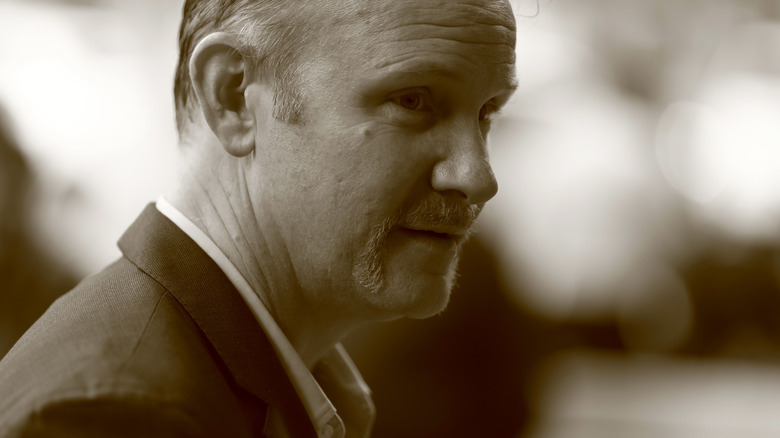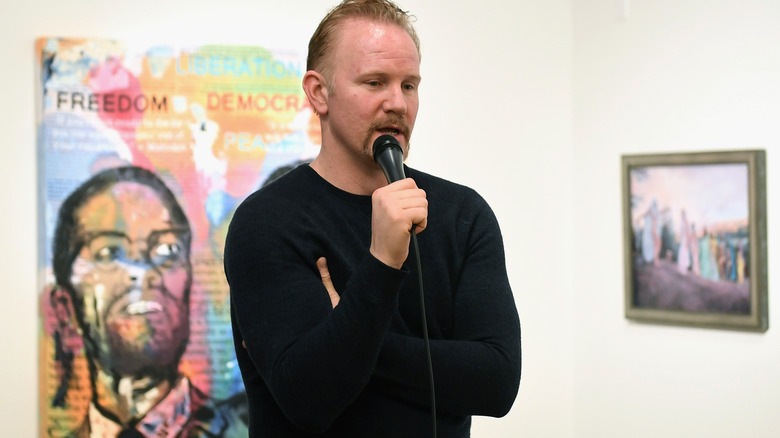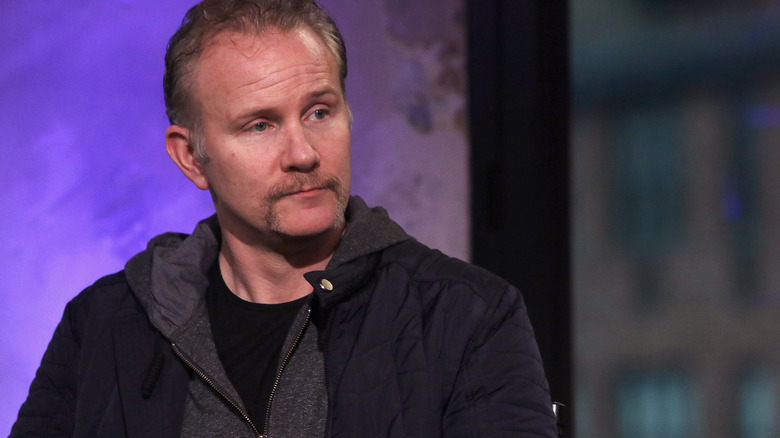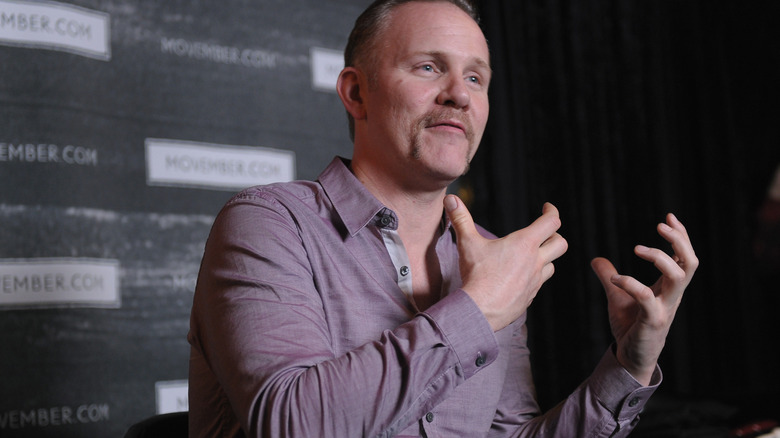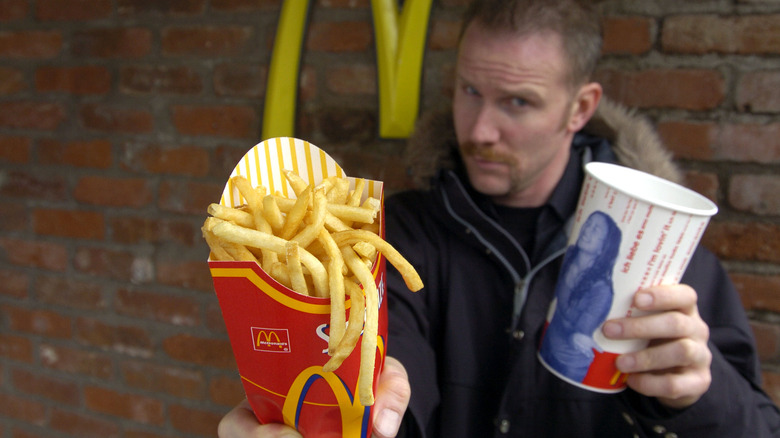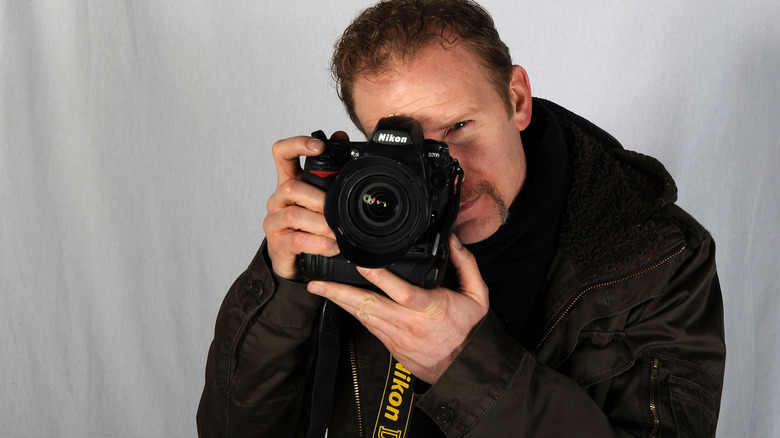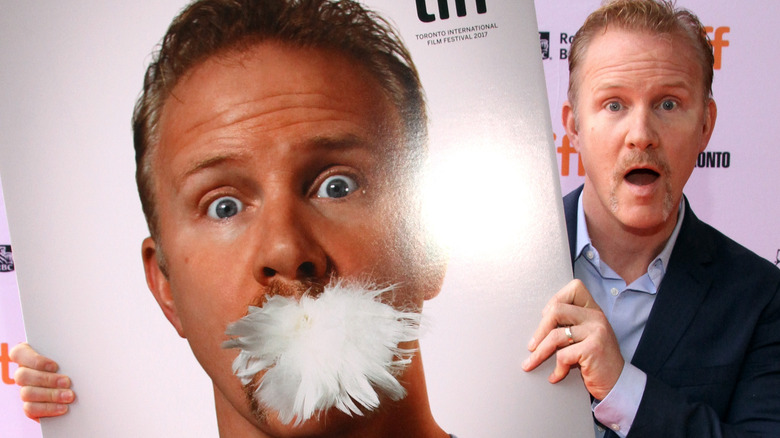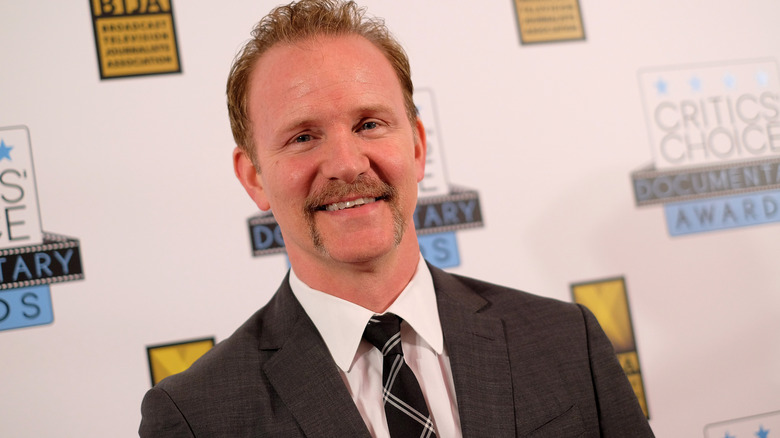The Tragedy Of 'Super Size Me' Director Morgan Spurlock Explained
Everyone loves a great documentary, whether it's a classic true crime doc or a creepy, keep-you-up-at-night documentary. While we might not personally know a serial killer or have seen a UFO, we've all been to McDonald's. So, when "Super Size Me" was released in 2004, it was a huge deal. Everyone kind of suspected that fast food was incredibly bad for you, and when documentary filmmaker Morgan Spurlock decided to risk his own health to show what it was doing to Americans across the country, it was eye-opening ... and artery-clogging.
It wasn't without detractors, however, and Spurlock went on to become an incredibly polarizing figure. While many said his 30 days of a McDonald's-only diet was a call for the nation to overhaul eating habits and personal responsibility, others pointed out the problems: He hadn't released precise records of his eating habits, studies hadn't been able to duplicate his results, and it was even accused of promoting unhealthy habits.
"Super Size Me" catapulted him to fame, and although he went on to helm a shocking number of projects, it was that documentary that stuck with him. In 2012, he told The Independent, "I'll be that guy till I die." That day came in 2024, when Spurlock died after being diagnosed with cancer. The 53-year-old filmmaker left behind a complicated legacy, so let's take a look at the tragic story of Morgan Spurlock's fall from public grace.
Morgan Spurlock's admission of sexual harassment didn't play out as he expected
The #MeToo movement gained serious traction in 2017, and that's also the year that Morgan Spurlock made a statement of his own. In a TwitLonger post, he wrote, "When I was in college, a girl who I hooked up with on a one night stand accused me of rape." He clarified that wasn't how he remembered it at all, and then, he went on to talk about paying a former employee to settle a sexual harassment accusation: "I paid for her silence and cooperation," he wrote. Spurlock talked about his chronic infidelity as well, writing, "I am part of the problem."
"I am part of the problem," he wrote again. "We all are. But I am also part of the solution. ... I will do better. I will be better. I believe we all can." Two years later, he sat down for a painfully honest conversation with Deadline, and said that the backlash was swift and harsh, even though he had thought he was doing the right thing by adding his voice to the cause and calling on everyone to do better. He found himself canceled by the media, fans, and colleagues alike.
"I felt like I needed to share something in the midst of this conversation that just seemed to dominate that moment in time," he said. "I regret a lot of things about it. I regret the impact it had on my family. I regret the impact it had on my friendships. ... Within a week, everything was done."
Morgan Spurlock's confessional had far-ranging consequences
After Morgan Spurlock posted his confessional to TwitLonger detailing incidents of sexual misconduct, he faced a massive backlash. It started with his "Super Size Me 2: Holy Chicken!" getting pulled, even as future projects were scrapped, and the writing was on the wall for his company, Warrior Poets. The most tragic part of the story was that the ripples reached far and wide, with those around him finding their lives suddenly changed in heartbreaking ways.
Spurlock posted on December 14, and later told Deadline, "I regret the impact it had on 65 people, who were working in my office, and then, within a week were suddenly out of a job. The week before Christmas ... To be in that position right before the holidays was the worst thing ever."
Also caught in the blast zone of Spurlock's career were poultry farmers who had been working on his "Super Size Me 2: Holy Chicken!" project. He explained that everything around the film had fallen apart after his confession, and that included the livelihoods of some of the farmers who'd appeared in the film. He named two in particular who had been blacklisted by the poultry industry for speaking out against abuses, only to find that everything had fallen apart. "I was crying, and they were crying. They said, 'We just hope you're okay,' and that was ... oh, it just makes me cry all over again."
His confession included the admission that he had experienced sexual abuse as a child
In 2012, Morgan Spurlock sat down for a conversation with The Guardian and described himself during childhood, saying, "I was awkward as a kid. I wasn't the best looking or the most athletic or the funniest — I was just persistent and tenacious." It wasn't until 2017 that he mentioned — in his now-infamous TwitLonger post — that his childhood contained one of the darkest chapters possible.
After sharing snapshots of sexual assault and harassment incidents, Spurlock pondered, "What caused me to act this way? Is it all ego? Or was it the sexual abuse I suffered as a boy and as a young man in my teens? Abuse that I only ever told to my first wife, for fear of being seen as weak or less than a man?"
Several years later, Spurlock confirmed that he had never sought help, spoken to anyone else, or been prescribed anything that might have helped him deal with the trauma from the incidents. Instead, he said, "I was self-medicating for a long time."
Morgan Spurlock had spoken candidly about mental health
As part of the consequences of his all-McDonald's diet in "Super Size Me," Morgan Spurlock spoke not only about the physical changes he saw happening, but the mental ones as well. He told The Guardian, "I started to notice this pressure on my chest, and by day nine, I was getting incredibly depressed. I would eat the food and feel fantastic for about an hour. Then I'd feel depressed again."
Spurlock had been honest, too, about the fact that he dealt with depression outside of the infamous 30-day McDonald's experiment. In a 2019 interview with Deadline, he revealed that during a conversation with his doctor about unspecified family issues, the talk turned to depression, and the floodgates opened.
"He asked, 'What about you?' I said, 'I'm depressed every day.' He says, 'What do you mean you're depressed every day? When?' I said, 'Every morning when I wake up and every night when I go to bed.' He said, 'What do you do?' I said, 'I get up and I start my day, I put my feet on the floor.'" At the time, he said that he was worried by the weight of the world — particularly the ever-developing news of the MeToo movement, and explained, "I said to myself, 'I have to talk about this.' ... I needed to first talk about my depression and talk about what I'd been going through."
When Morgan Spurlock spoke about MeToo, he revealed his own addiction issues
It's impossible to know what's really going on behind the scenes of another person's life, even if they're in the spotlight. Although Morgan Spurlock's life-altering TwitLonger post was fairly short, there was a lot packed in, including mention of his addiction issues.
When he turned the figurative camera lens on himself, he asked himself why he had become a part of that toxic, misogynistic culture. "Is it because I've consistently been drinking since the age of 13? I haven't been sober for more than a week in 30 years, something our society doesn't shun or condemn but which only served to fill the emotional hole inside me and the daily depression I coped with. Depression we can't talk about, because it is wrong and makes you less of a person," he added.
Alongside releasing the post, Spurlock checked into rehab. When he came out, he told Deadline that his life had changed entirely: He found himself canceled along with countless other Hollywood stars. A year and a half later, he was facing bankruptcy. At the time of his Deadline interview, Spurlock said he was still trying to make amends: "[Rehab] gave me clarity. ... I came back and saw the world in a very different way ... I saw the way I wanted to live my life and treat people, the husband I wanted to be, the father I wanted to be in a very different way."
His MeToo confession led to questions about Super Size Me
There are no doubts that holding the fast food industry accountable for the choice of whether or not to provide healthy options is a good thing, but "Super Size Me" had a fair share of critics who were skeptical about Spurlock's reveal of the shady secrets of McDonald's. In 2006, researchers from Sweden's University of Linkoping (via The Guardian) tried replicating the results with a group of healthy student volunteers. The results were weight gain and discomfort, but nothing as death-defying as what Morgan Spurlock's doctors had reported.
After Spurlock published his TwitLonger post, various media outlets were quick to point out that it contained something that threatened to put his whole experiment at risk. One of the things that Dr. Fredrik Nystrom of the Swedish experiments didn't see was the liver damage reported by Spurlock's doctors. When the doc was released, it was a huge deal — Spurlock's reported liver damage made headlines. But when he wrote about not having been sober for pretty much 30 years, critics wondered if that had been the source of the damage.
In the film, Spurlock specifically says that he was, at the time, not drinking any alcohol at all. When the truth came out, it cast a long shadow over the documentary and the claims made within it. (Click here to read about other documentaries that have been less than truthful.)
A planned docuseries highlighting women's issues fell through and led to a lawsuit
When Morgan Spurlock stepped away from his production company amid his confession of sexual misconduct and his entry into rehab, it put an end to a project that had the potential to do a lot of good. Spurlock had been planning to work on a series with Sarah Jessica Parker: The TNT vehicle was going to spotlight women's issues (including body autonomy, family planning, and workplace discrimination), and it was going to be called "Who Rules the World?"
However, Spurlock's revelations changed pretty much everything, and not only was the project scrapped, but it also led to a massive lawsuit against him. Turner Entertainment demanded complete repayment of all the money that had been spent on the project to that point, and made it clear exactly why they were cutting ties with Spurlock.
By the time the lawsuit was settled, it left Spurlock with a hefty $1.17 million he needed to pay back. At the time, he had little else to fall back on as YouTube, Sundance, and Showtime had also severed their agreements with him.
Super Size Me 2 wasn't the big deal it might have been
Animal welfare and the cruelty found in many factory chicken farms have been hot-button topics for years. In 2017, Morgan Spurlock was poised to take on Big Chicken in "Super Size Me 2: Holy Chicken!" Alongside the documentary, Spurlock had plans to open his own restaurant as well. It, too, was called Holy Chicken! and Spurlock told Today that there were plans to open permanent locations, although many outlets seemed to suggest it was just a promotional stunt for the documentary.
The idea was that the entire place was going to be designed to shine a spotlight on sneaky marketing: Using green to make people think fresh, avoiding the word "fried," and the use of things like fake grill marks. Spurlock told Nightline, "You're never gonna put big chicken out of business ... But I think the goal of Holy Chicken is, 'How do you start to at least level the playing field?' ... The way we'll beat them is ... [by] creat[ing] a truly farm-to-table, local fast food restaurant."
Affordable, honest, fast food you can feel good about? All that sounds pretty amazing, but Spurlock's restaurant never gained traction — and it's unclear whether or not it ever opened much beyond the promo stage. The restaurant — like the documentary — was another victim of the backlash over his sexual misconduct admission. (Click here for an eye-opening look at meat plants.)
Morgan Spurlock died at 53 following a cancer diagnosis
Morgan Spurlock's death was announced in May 2024. His brother, Craig, issued a statement (via Variety) saying, "It was a sad day, as we said goodbye to my brother Morgan. Morgan gave so much through his art, ideas, and generosity. Today the world has lost a true creative genius and a special man. I am so proud to have worked together with him."
Immediate details were scarce, but it was revealed that his official cause of death was complications from cancer. At the time of his death, Spurlock had nearly 70 film and television credits to his name, including the docuseries "30 Days."
The series was produced by R.J. Cutler, who paid tribute to Spurlock's visionary talents via Variety. "So much ... was about seeing the world from the other's point of view. That was Morgan's vision and it infused all of his filmmaking. He abhorred hypocrisy, he loved to laugh, and he loved to inspire laughter in others. And as we all know, he wasn't afraid to face criticism for his efforts to make the world a more honest place. He left us way too early but left the world far richer for his having been here."
"Super Size Me" changed the world: Click here to learn how.
If you or anyone you know needs help with addiction issues, may be the victim of child abuse, has been a victim of sexual assault, or needs help with mental health, contact the relevant resources below:
-
The Substance Abuse and Mental Health Services Administration website or contact SAMHSA's National Helpline at 1-800-662-HELP (4357).
-
The Childhelp National Child Abuse Hotline at 1-800-4-A-Child (1-800-422-4453) or contact their live chat services.
-
The Rape, Abuse & Incest National Network website or contact RAINN's National Helpline at 1-800-656-HOPE (4673).
-
The Crisis Text Line by texting HOME to 741741, call the National Alliance on Mental Illness helpline at 1-800-950-NAMI (6264), or visit the National Institute of Mental Health website.
